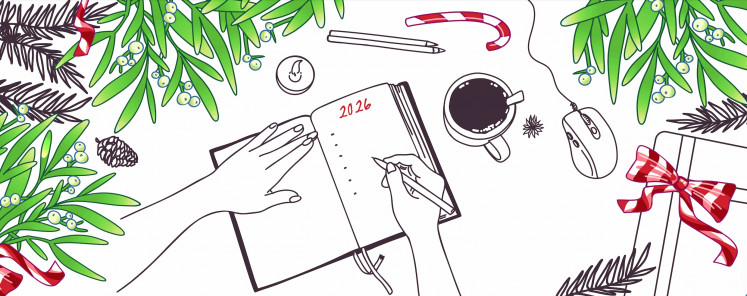Popular Reads
Top Results
Can't find what you're looking for?
View all search resultsPopular Reads
Top Results
Can't find what you're looking for?
View all search resultsEssay: Developing subversive identities through literary activities
Writing is more than just a cognitive activity; it is a social activity as well.
Change text size
Gift Premium Articles
to Anyone
T
eaching English academic prose and supervising students in writing their theses has been a really rewarding and intellectually engaging experience, at least to me. Not only could I learn how students struggle painstakingly to pour out their ideas, to structure their thoughts from their own perspectives and to assemble those from other writers they are quoting, but I could also feel how desperately they forayed into high-stake literary activities like academic writing.
No less an intriguing episode in the students’ experiences was when they grappled with fathoming convoluted writing conventions that were employed to satisfy the expectations of the invisible audience.
This experience has told me one important thing: writing is more than just a cognitive activity; it is a social activity as well. This is to say that in writing, you can’t rely exclusively on your individual knowledge at the expense of the social forces that shape the ways you structure and pattern your ideas.
Surely, for both undergraduate and graduate students, writing in an academic genre and for an academic community or audience is of paramount importance if they are to succeed in their learning. In fact, their academic fate is determined by whether or not they are dexterous in their scholarly writing. This is especially true, given the looming government regulation that obliges university students to write and publish in scholarly journals.
With this imminent regulation, students have no other option for graduating unless they actively engage in academic literacy. It is publishing their scholarly works that will matter at the end of their studies, rather than simply defending their theses before their examiners, as has been a customary at higher learning institution of late. In other words, they will be confronted with the “publish or perish” dictum.
Yet, as a teacher of writing who has been in the profession for quite a long time, observing (and at the same time sympathizing with) the students’ arduous and painful intellectual efforts invested in the meaning-making process of writing is a much more momentous experience than simply being complacent about the products of writing (how titillating and intriguing they appear to the audience) they have accomplished.
This is because writing in academic genres for an academic audience involves relatively more cognitive and rhetorical efforts than writing in other genres; say poetry writing and short-story writing.
It seems to be an axiom that academic writing is infamous for its detachment (the authors from the object of the writing), objectivity and impersonality — a literacy practice not particularly common for students who come mainly from a culture where oral tradition is highly valued.
What is really revealing to me when I closely follow the ways the students produce an academic piece is how they deal with tension and conflict, which occur often in the writing process.
On the one hand, students insist on displaying their personae in writing because they feel comfortable in doing so. On the other hand, the characteristics of academic genres dictate otherwise, demanding students to distance themselves from their writing and to present their ideas as objectively as possible.
For most of the students that I’ve been engaging with, they’ve no courage to flout what has been prescribed to them by their teachers, fearing that their teachers will give them a bad grade or even fail them.
Yet, I sense that there’s a sort of pretentious moral certitude on the part of these students to obediently follow what their teachers implore them to write. For the sake of pleasing their teachers, they submissively do what they are expected to do. Resisting instructions runs a risk for them.
But in reality, students cannot hide their conviction in what they believe to be the truth in writing. For most of them, writing — irrespective of its diverse genres — is always a personal and expressive activity. They can express what they want to say in writing without necessarily conforming to rigid or formulaic conventions that limit their latitude in communicating their ideas.
Quite interestingly, I found that rather than overtly resisting the established academic conventions, students collaboratively construct an alternative space in the classroom where they can oppose and defy the instructions that exhort them to obediently follow the institutionally desired conventions.
I personally managed to document (through an informal talk with students) how they subvert their identities in writing through such acts as false compliance, parody and even lying — all of which are kinds of overt resistance to the imposition of one-sided instruction.
In another case, this identity subversion may find its realization in cyberspace, where students can freely share ideas with their peers without the surveillance of authority figures.
These spaces constitute a safe place for students to exchange with their peers their anger and frustration at the pressure they experience during the process of completing writing assignments. As they are relatively surveillance-free and hidden from the real world, students can unleash their frustrations by using sarcasm and taboo words intended to mock the unequal power distribution they experience in classroom settings.
Cyberspace is also a safe zone for students to celebrate their subjugated identities, and could have the potential to be used as a space where they may reflectively develop solidarity in challenging and opposing the imposition of a dominant mode of communication that may not always be congruent to their preferred identities.
On a positive note, this alternative communication space offers students ample opportunities to creatively and critically construct their own identities vis-à-vis the imposed identity desired by their teachers and institutions which they consider oppressive.
In fact, these subversive identities displayed both in the real world (i.e. the classroom) and virtual world (i.e. cyberspace) enable students to critically question the imposed mainstream perspectives and thinking.
The valuable lesson that I have learned from these creative ways of developing alternative identities is that in the context of digital communication and information technology, students should not be treated as merely passive recipients of knowledge, but as critical beings who have the potential to construct their own perspectives and knowledge in unprecedented ways.
***
The writer teaches at the graduate school of Applied English Linguistics, Faculty of Education and Language, Atma Jaya Catholic University, Jakarta.











